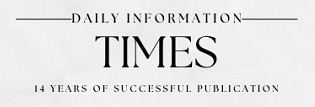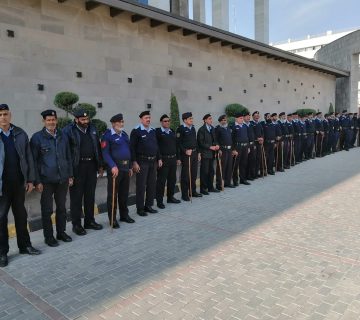ISLAMABAD, Nov 3: The Election Commission of Pakistan (ECP) submitted before the Supreme Court (SC) on Friday the notification confirming February 8 as the final date for general elections.
The electoral body made its announcement under Section 57 of the Election Act.
At the last hearing of the case now disposed of, a three-member bench, led by Chief Justice of Pakistan Qazi Faez Isa and comprising Justice Aminuddin Khan and Justice Athar Minallah, directed the ECP to confer with the president and inform the apex court of the final poll date after the electoral body submitted before the court its long-awaited proposed schedule.
After receiving the notification, CJP Isa made it clear that if anyone casts doubt on the final date for polls now announced, the apex court would “deal” with it.
He made these remarks after asking all parties if they were on board with the date notified by the ECP.
His remarks were seconded by Justice Minallah who said that now that the final date has been submitted before the apex court no one would be allowed to violate it.
The apex court had taken up pleas moved by the Supreme Court Bar Association (SCBA), Pakistan Tehreek-e-Insaf and Ibadur Rehman Lodhi seeking elections within the 90-day time period after the dissolution of the national and provincial assemblies.
During the proceedings, the bench noted that both President Dr Arif Alvi and the ECP had placed the top court in an awkward position as neither the Constitution of Pakistan nor the law authorised it to determine the election date.
CJP Isa observed that in the letter Dr Alvi wrote to the ECP, he had in his capacity as president advised the commission to take guidance from the judiciary regarding polls.
“According to the law and Constitution, the Supreme Court has no role in setting a date for election,” said CJP Isa, noting that it was surprising that the president had suggested taking guidance on the matter from the court.
“The president could have taken guidance from Article 186 of the Constitution,” he remarked. “Constitutional offices like the ECP and President of Pakistan should do what the Constitution says,” said the CJP. emphasising that abiding by the Constitution was not optional.
He noted that the president did not seek advice from SC under Article 186 in this matter and further remarked that the matter between the ECP and the president was “unnecessarily brought to court”.
The CJP observed that the entire country was put through uncertainty by the relevant offices not announcing an election date long after the National Assembly was dissolved. “There were fears that elections won’t take place at all,” he added.
The CJP asserted that the judiciary should not adopt the role of institutions while stressing that the apex court had only facilitated the ECP and president toward reaching a resolution.
Both the president and the ECP are responsible for implementing the Constitution, he noted. It is equally important that all constitutional bodies do not interfere in each other’s domain, he added.
“It is now time that we not just follow the Constitution but also look at the country’s constitutional history,” said CJP Isa. He regretted that the country’s institutions and people had to pay the price for instances when the Constitution was violated.
“Let there be no misconception that we have given the date of the elections,” emphasized CJP Isa, directing the ECP to release the election schedule.
He added that running news casting doubt and creating speculation now that a final date has been decided on would also stand in violation of the Constitution. He directed the AGP to ensure the Pakistan Electronic Media Regulatory Authority (PEMRA) takes action in such an event.
Without naming the PTI chairperson, the CJP observed a constitutional crisis was created when the National Assembly was dissolved by former premier Imran Khan after he was ousted through a vote of no-confidence.
“God willing, elections will be held on February 8,” said the top judge.
The court subsequently disposed of the pleas.
Polls, finally!
Earlier, Attorney General of Pakistan (AGP) Mansoor Awan, Chief Election Commissioner Sikandar Sultan Raja and PTI lawyer Barrister Ali Zafar had reached the SC premises.
AGP Awan apprised the top court of the minutes of the meeting held between CEC Raja and President Dr Arif Alvi, wherein it was decided that polls will be held on February 8, 2024.
However, Chief Justice of Pakistan Justice Qazi Faez Isa observed that the president’s signatures were missing from the documents submitted in court. He remarked that there was no one present before the SC to represent the president and his official signature were missing.
At the CJP’s objection to missing signatures, AGP Awan stated that Dr Alvi had given a separate letter.
The bench asked the federation’s lawyer to submit documents with signatures from both parties and briefly adjourned the hearing.
The National Assembly was dissolved on August 9, 2023, three days short of completing its constitutional term of five years. Article 224 of the Constitution of Pakistan stipulates that elections be held within 90 days of the dissolution of assembly, which in this case would have meant general elections in November 2023.
However, under Section 17 of the Elections Act, the ECP was bound to delimit constituencies after the official publication of each fresh census.
The political sphere had been gripped with uncertainty as the electoral body delayed announcing an election date in the months following the National Assembly’s dissolution.
In late August, President Dr Arif Alvi had invited CEC Sikandar Sultan Raja to discuss the fixing of the election date within the 90-day constitutional deadline. However, the ECP had rejected the president’s request to resolve the matter claiming his input was not needed.
Later, the interim law ministry told Dr Alvi that the assemblies were dissolved on the recommendation of the prime minister and the legislation approved by parliament did not authorise him to give the date of the polls. It apprised that after recent amendments to the electoral law, the ECP held the sole authority to set the date for polls.
During the proceedings on Thursday, ECP’s counsel Sajeel Swati apprised the apex court that polls would be held on February 11. He further apprised the court that the entirety of its process would be completed by January 29.
At this, CJP Isa remarked that the apex court would bind the ECP to conduct polls on the final date it is issuing. “We will not carry out the ECP’s work, but will bind the authority to stick to the date issued.”
CJP Isa directed the ECP to finalize the date in consultation with the president and apprise the court.
On the CJP’s insistence for a clear stance on polls during Thursday hearing, the ECP counsel apprised that there was a 54-day schedule after the delimitation process. “All arrangements, including the drawing of constituencies will be completed by January 29,” said Swati.
He apprised the court that the ECP will publish the list of constituencies on December 5 after completing delimitations by November 30, as stated earlier, then leaving time for redressal if needed and preparations.
“We decided that elections will be held on Feb 11, which is the second Sunday [after Jan 29],” he informed the court.
CJP Isa inquired whether President Dr Arif Alvi was taken on board to which Swati replied “we are not bound to take the president on board”.
Irked, the CJP remarked, “both the president and ECP are Pakistanis. Why is the ECP hesitant to consult with the president?” He directed the electoral body to confer with Dr Alvi the same day.
The court then broke for a recess awaiting a final date for the polls by the ECP.
However, after a half-hour break, Swati apprised the bench that the electoral body would consult with president later that day.
“Knock his door even if he doesn’t call you,” remarked Justice Isa and then instructed AGP Mansoor Usman Awan to facilitate the consultation and stay on board during it.
“SC wants polls to be held without any arguments,” remarked the CJP. He added that the apex court only sought a resolution to the matter and did not want to get stuck in any technicalities. He reiterated that the final election date would have to be implemented.
Later, the bench issued its written order summarizing the ECP’s stated schedule for polls and directing the electoral body to inform the court of the final date on Friday after consultation with the president.
Case history
At the first hearing of the case, CJP Isa had remarked that “all of us want elections, but a wrong impression is being created that we are not interested”.
The court had issued notices to the government of Pakistan and Election Commission of Pakistan (ECP), which has ruled out polls this year citing the need for fresh delimitation of constituencies given the approval of the 2023 digital census. Later, the electoral body stated that polls would be likely held in January 2024 but has yet to announce a final date. The bench had noted that they could fix the date for polls within 10 days.
The petitioners in this case challenged the August 7 notification issued by the Council of Common Interests (CCI) besides amendments to Section 57 of the Elections Act, which empower the chief election commissioner to announce the date for polls.
The petitioners had moved the court to direct the relevant authorities to hold polls within 90 days as mandated under Article 224.




No comment